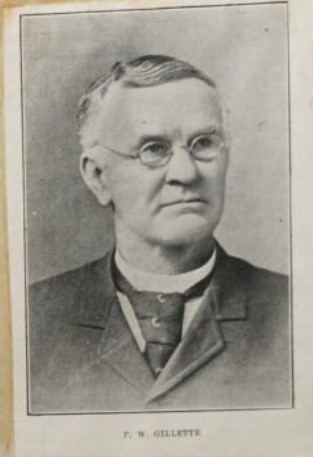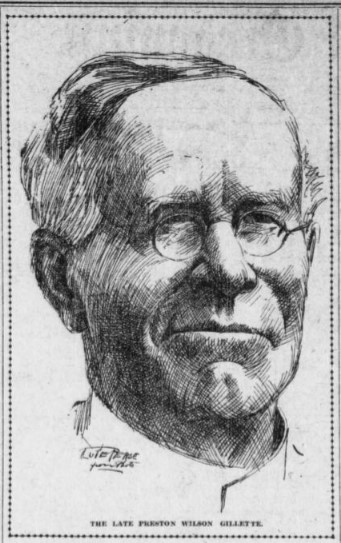 Many of our readers will recollect P. W. Gillett, a former citizen of this county, but for the past 18 months, a citizen of Oregon. The following is an extract from a letter written by him, dated July 14, 1853:
Many of our readers will recollect P. W. Gillett, a former citizen of this county, but for the past 18 months, a citizen of Oregon. The following is an extract from a letter written by him, dated July 14, 1853:
Ironton Register 6 Oct. 1853
“That portion of Oregon adjacent to the Rocky Mountains, and down the Snake River to its junction with the Columbia, is made up of sandy plains and barren mountains, almost destitute of fertility, and bearing unmistakable evidence of volcanic action. From the mouth of this river to the Pacific Ocean, a distance of about three hundred miles on an east and west line, the country is very beautiful and very fertile.
It is well watered with rivers and mountain streams, affording means of navigation in some parts and abundant water power. It is beautifully diversified with high mountains, extensive valleys, deep forests, and pleasant glades. The scenery at places is grand. One may stand in the midst of beautiful valleys in a climate of almost perpetual spring and see at one view five or six peaks covered with perpetual snow.
The soil is rich, producing wheat, oats, barley, rye, and vegetables of almost all kinds in greater quantities than I have ever seen elsewhere. The prairies are covered with luxuriant grass on which cattle, horses, sheep &c. keep fat during the year, in summer and winter. Grazing is very profitable owing to the high prices of cows, oxen, and beef.
As to prices, cows are worth from $80 to $100; oxen $150 to $225 per yoke; beef 18 to 20 cents per pound; butter now 62 1/2 cents per pound, in the winter, $1 per pound; and since I have been in the country wheat has ranged from $2 to $5 per bushel; flour from $16 to $50 per barrel; oats from $1 to $3 per bushel; potatoes from $1.50 to $7; onions $4 to $8; turnips $1 to $3; cabbages from 50 cents to $1 per head. These are said to be rather above the average prices of the country.
The climate is very even in temperature, never becoming very warm nor very cold – and is the healthy I have ever known. There is some ague on the bottoms of the Columbia, but with this exception, the country is almost perfectly healthy.
The society is of a mixed character but rather good – better than in some of the Western States. Religion, Temperance, and Education go hand in hand with general prosperity. On the 4th of July, we had a temperance celebration within a mile of the ocean and had the booming of the independence cannon.
The country is improving with amazing rapidity, and soon the land and water emigration will fill up the country – making two large, wealthy, and populous States, Oregon and Washington. The resources and natural advantages of Oregon are unequaled by any other State – fertile soil, healthy climate, variety of productions, rich gold mines, vast water power, lumber trade, fisheries, and commercial advantages all combine to make its rapid progress to greatness inevitable.
With regard to myself, I am highly pleased with the country and my situation. My place is within three miles of the ocean and six of Astoria, on the banks of the Lewis and Clark River, navigable for steamers and other vessels some miles above. Property so near the mouth of the Columbia is bound to be immensely valuable, so I consider myself already rich. I can make $6 per day easier than I could make $1 per day in Ohio, and now make that amount every day I work.”
Joel Gillet was born in Milford, Connecticut, on May 28, 1778. He was the son of John and Comfort (Plumb) Gillett. Joel married Cloa Griswold in the late 1790s. Cloa was born October 11, 1779, in Burlington, Connecticut. She was the daughter of Jeremiah and Phoebe (Case) Griswold.
The Sunday Oregonian, Portland, Oregon, Jan. 22, 1905
page 10
P.W. Gillette Dead
Pioneer Succumbs to Attack of Neuralgia
Leaves a Worthy Career
Attack Comes Suddenly and Unexpectedly During Morning, Death Following Later in the Day – First to Bring Flowers

Preston Wilson Gillette, aged 79 years, succumbed yesterday to an attack of neuralgia of the heart after a very brief illness. The demise of Mr. Gillette came suddenly and plunged into profound sorrow, his widow and a multitude of friends.
Excepting a slight cold contracted in the early part of the week, Mr. Gillette’s health until yesterday morning was apparently of the best. He arose as usual and, while preparing for breakfast, complained of neuralgia in the chest. It was not thought at the time that the attack was serious, and although a physician was summoned, he left Mr. Gillette to the care of his family.
At 4:30 p.m., Mr. Gillette was again stricken, this time seriously. He passed away at 4:45 p.m. A widow and one son survive him. The funeral will occur Monday, with the interment at Riverview Cemetery.
Mr. Gillette is descended from French Huguenot ancestry. He was born in Lawrence County, Ohio, on June 2, 1825. His father was a nurseryman, and young Gillette, after acquiring such education as was common in the neighborhood schools of his youth, learned the nursery business.
The discovery of gold on the Pacific Coast led him to consider the question of moving the Far West, and on May 8, 1852, he severed the ties of early youth and manhood and started across the plains via St. Joseph, Missouri.
After a weary journey with ox teams, he arrived at “Fosters,” near the Eagle Creek post office of today, in Clackamas County, on Sept. 15. The first winter in Oregon, he spent in Marion County. In Feb. 1853, he moved to Clatsop County, settled near the site of Lewis and Clark’s “Fort Clatsop,” and made his home there until 1867.
During those years, he conducted the nursery business, having sent to his father for a good assortment of nursery stock during the early part of the first winter after his arrival.
With possibly one exception, he was the first to introduce cultivated strawberries – Hovey’s Seedlings and the red and yellow Antwerp raspberries. It is believed he brought the first collection of ornamental plants to Oregon, such as lilacs, honeysuckles, etc. Aside from the Mission Rose, there was, but one other cultivated rose in Oregon prior to the stock he secured from the east via the Isthmus early in 1853.
Mr. Gillette was a member of the Legislature from Clatsop County in the sessions of 1862-64 and also for the special session when the 14th amendment was adopted.
After removing to Portland in 1867, he was the subscription agent and traveling correspondent of the Oregonian for a number of years. He then became prominently identified with the business interests of Portland and accumulated considerable property.
On August 20, 1888, he was married to Miss Mary MacCabe, by whom he has had one son, who, with his mother, survives him.’He was an ardent Republican in political faith and was a frequent contributor to the press on matters relating to pioneer days.
For many years he was a member of the Oregon Pioneer Association and became an enthusiastic member of the Oregon Historical Society during the first month of its existence in 1899.

0 Comments